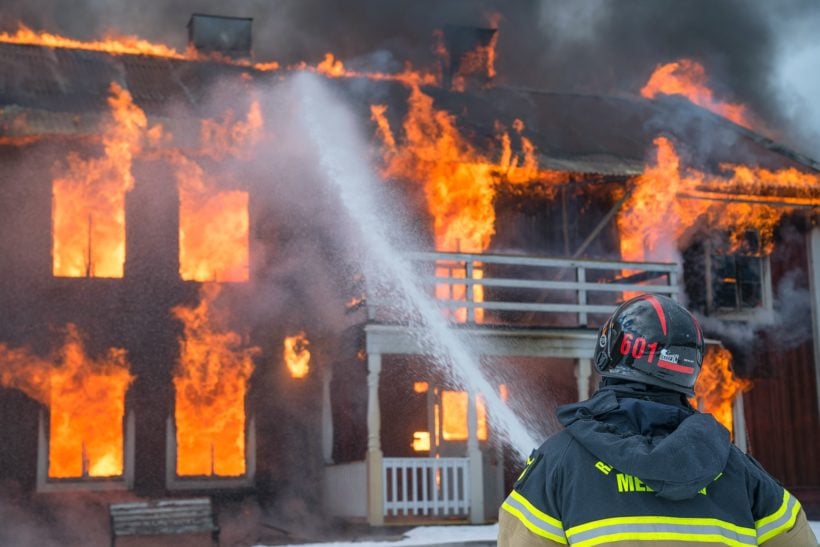This article is part of an ongoing series of basic financial education brought to you by financial industry professionals curated by PocketFin – The Financial School of Real Life. CNBC Africa provides content from PocketFin as a service to its readers but does not edit the articles it publishes. CNBC Africa is not responsible for the content provided by PocketFin.

Life is scary. Just by stepping out the door you are invitingeveryday risks to your health and possessions. These risks can often turn into life events such as car accidents, health issues and theft. Let us zone in on the car accident. Hopefully not, but should you suffer an accident, are you financially capable of repairing your car, the third party’s vehicle and damage caused to public property or a private residential. For most South Africans, the honest answer to that question is no. Therefore, non-life insurance, also known as short term insurance, is crucial.
According to lifeinsurance.org, “Non-life insurance is any type of insurance other than life insurance. While life insurance is broken down into permanent and term life policies, non-life insurance includes many types of other insurance policies. Non-life insurance may cover people, property or legal liabilities.” Non-life insurance is also sometimes referred to as short term insurance because these policies are usually taken out during a period of necessity. This type of insurance is primarily aimed at protecting your assets, your person, business or travels aboard. Some examples of non-life insurance are vehicle insurance, household and content insurance, medical aid and travel insurance.
Let’s unpack some of the different types of short term insurance:
Vehicle insurance covers the costs if your car is either stolen or in an accident. Not only does this type of insurance coverthe costs of replacing or repairing your vehicle, but it can also cover financial costs incurred by your passengers, other drivers and their vehicles. The latter is known as 3rd party insurance. Some people only have 3rd party insurance. There are many reasons for this, but a couple of reasons may be that that the vehicle is too old or in too much of a bad shape for the owner to worry about loss or damage to it or, affordability of comprehensive cover. We recommend always taking up comprehensive vehicle insurance and this is why. Imagine you have just rolled out of the showroom with your new baby and bang! That is it, written off. Now, if this were a new vehicle that is being financed, you would have been forced to take up vehicle insurance. Due to the current Macro economic climate and according to the National Association of Automobile Manufacturers of South Africa, in June 2020 new vehicle sales were 30.7% down when compared with June last year. At the same time, the South African used car market performed better than it did the previous year. So, what does this add up to? According to the AA “there are just over 11 million registered vehicles in South Africa (excluding caravans and trailers). According to statistics, most of these vehicles – around 60-70% are uninsured.” In short, vehicle insurance is not only there should you cause an accident and are liable but is a stress-free way of ensuring that if you abide by the law in combination with your policy wording, you will always be “covered” against accidents caused by you or someone else and will not have to rely on our legal system and/or negotiations with the third party to repair or replace your vehicle.

Content insurance covers damage or losses suffered to your personal possessions and commonly includes electronics, clothes, furniture etc. Please note that some items are usually excluded from this cover unless stipulated that they should be included. Chat to your financial advisor or insurance representative to ensure that all the items which deem dear and/or expensive to replace have been covered.
Homeowner cover is a type of insurance that focuses oninsuring you against loss or damage to the structure of your home. It can cover the cost of purchasing a new home orrepairs due to damage. Think about it, with all the rains we have had over the last few months, what if a pipe burst and caused significant damage to your property? Are you in a position to fix this out of pocket? Again here, the answer is no for most South Africans. Most financial providers require mandatory homeowner cover as a condition for approving anyhome loan for this reason.

According to scielo.org.za, a study was conducted at an 846-bed central hospital in the eThekwini Health District in KwaZulu-Natal. The mean cost per admission was R157 883 in the trauma ICU, R201 347 in the neurosurgical section and R332 161 in the medical and surgical section of the combined ICU. Adding 6 years of inflation to the numbers supra start to resemble a horror movie. This is why medical aid, especially in South Africa, is crucial. Although a large portion of the population make do with the public health sector, it isimportant to understand that for a large majority of them, there is no option. Although a great medical aid and gap cover may be expensive, it provides another level of comfort when it comes to your piece of mind in medical emergencies. Medical aids can be expensive, a great option is a hospital plan. A hospital plan covers you for any medical procedures that are performed in a private hospital and just like a medical aid, it requires you to pay a monthly premium that would cover you for treatments and procedures in a private hospital. Therefore, the most expensive part of having to go to hospital in the case of serious injury is covered.
A lessor know form of short-term insurance is travel insurance. This form of insurance covers you for lost luggage, cancelled flights and unexpected medical expenses. There are a few crucial things to think about before you purchase travel insurance for a trip:
1. How much medical aid do you already have for the territory and activities which you will be partaking in – No one wants to think about getting sick or having an accident on holiday but, unfortunately just like stepping out of your home you opening yourself up to a number of risks and possible life events.
2. The activities you’re likely to be doing – If you’re planning anything really extreme, you may need additional cover for extreme sports.
3. The cost of your trip – If you have to cancel a flight or the trip in its entirety, it’s important to know that you can get all or some of your money back
It’s extremely important to understand your cover and go through the policy wording. As we saw with Covid-19, some people were covered, and others were not.
Simply put, short term Insurance is not a luxury, it is a necessity. It is that piece of mind when you walk into a hospital, you hear that ding against your car or the heavens decide to open up like they did over the SADC region earlier this year. You work so hard growing your wealth, why not protect it with the plethora of short term cover options available in the market. Just ask yourself, could you pay for your car, house, content and/or health should something go wrong right now?
We encourage you to sign up to PocketFin and you will be enabled to master your understanding of all aspects around building a successful financial future!